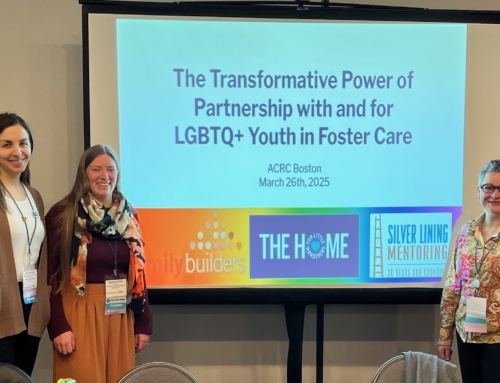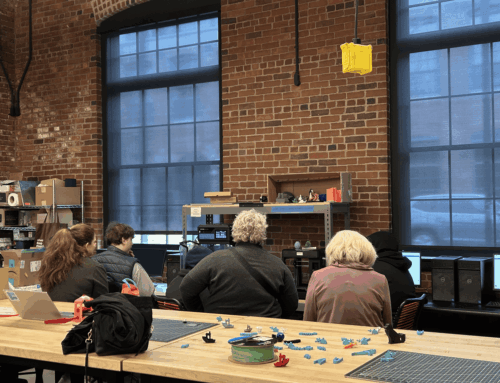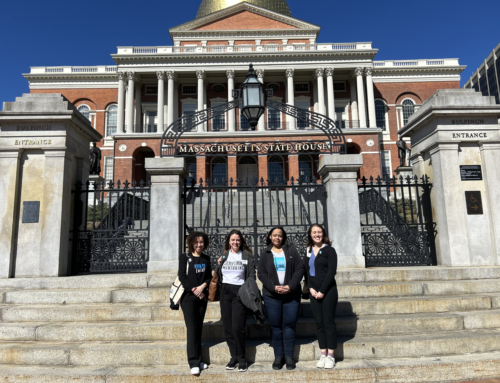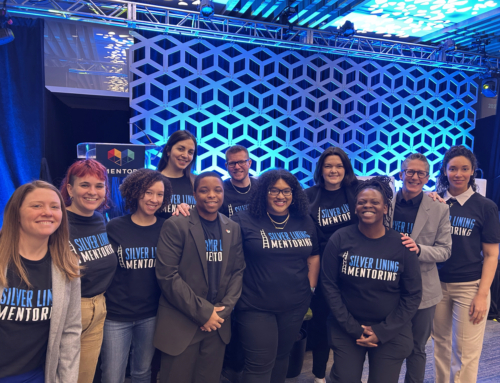Written by: Leah Harrigan, Assistant Director of Education and Training
The 2024 National Mentoring Summit convened by MENTOR in Washington D.C. offered a great opportunity to turn virtual connections to real life relationships, capitalizing on the time shared in person building community. There’s nothing quite like getting together with a couple thousand mentoring champions including youth leaders, researchers, advocates, and investors dedicated to creating positive change in the lives of young people and working to support the next generation in their access to quality mentoring.
I found myself having inspiring conversations with practitioners about dreams they’ve set in motion, like launching a mentoring initiative pairing youth with trained mentors who work in public safety or leveraging long-term healing models to match caring adults with children who lost loved ones serving in the military post-9/11. I learned about the facets of an innovative educational movement that leverages mentorship to help students develop an entrepreneurial mindset and “become the CEO of their own lives.” Each person I met seemed unified with the same shared belief: Every young person matters.
Mentoring Advocacy in Action
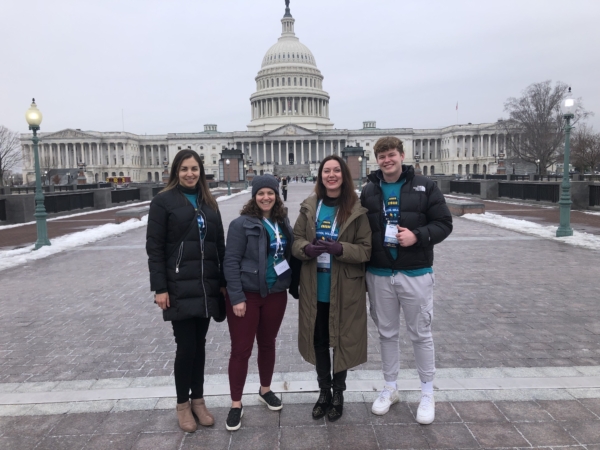 At the start of the Summit, I represented Silver Lining Mentoring during Capitol Hill Day, an annual opportunity to come together and advocate for congressional support for mentoring. After receiving training from the MENTOR Government Relations Team, I joined a group of fellow Massachusetts advocates to ask congress to increase overall funding and co-sponsorship for our legislative priorities in mentoring. A bonus was that we were joined by new friends from MentorProgramma Friesland in the Netherlands, who were excited to learn about U.S. advocacy practices. We found ourselves having meaningful conversations with them about privilege, race, and economic disparities that led to the critical need for mentorship for young people of color in the United States.
At the start of the Summit, I represented Silver Lining Mentoring during Capitol Hill Day, an annual opportunity to come together and advocate for congressional support for mentoring. After receiving training from the MENTOR Government Relations Team, I joined a group of fellow Massachusetts advocates to ask congress to increase overall funding and co-sponsorship for our legislative priorities in mentoring. A bonus was that we were joined by new friends from MentorProgramma Friesland in the Netherlands, who were excited to learn about U.S. advocacy practices. We found ourselves having meaningful conversations with them about privilege, race, and economic disparities that led to the critical need for mentorship for young people of color in the United States.
Equipped with personal stories and data-backed evidence, we were tasked to speak with the legislative assistants at the offices of Representatives Ayanna Pressley and Stephen Lynch, as well as the offices of Senators Elizabeth Warren and Ed Markey.
Among the initiatives we advocated for was the Foster Youth Mentoring Act. I personally shared stories about the importance of trauma-informed approaches in mentoring, the benefits of specialized mentor training for youth in care, and the incredible progress we’ve seen when young people are paired with volunteer mentors who are intentionally separate entities from paid child welfare providers. We clearly articulated that the Act would go a long way to advance our mission to provide healthy volunteer mentor relationships and enhance mentoring programs that serve youth in care. The experience served as a powerful reminder that change is within reach when we strategically come together and make our priorities known.
From Mentoring Connections to Commitment to Youth
 Capitol Hill Day was just the start of the Summit! I spent the following days joining conference workshops, discussions, and panels with fellow Silver Lining staff. Our team attended workshops covering topics on organizational climate, partnership building, and mentoring in the digital age among others. We joined spaces like the moving plenary on Mentoring Black & Brown Girls, a podcast-style conversation that explored themes of inclusion and representation through story, poetry, and song. We heard powerful messages, like when MENTOR CEO Jermaine Myrie reminded us that “Our movement is one of purpose and opportunity. It is not optional or passive.” An unexpected takeaway for me was forging connections with international mentoring programs, as I learned how practitioners in Canada, Spain, and France were developing quality systems in mentoring. The conference was packed with innovative approaches to mentoring and new connections.
Capitol Hill Day was just the start of the Summit! I spent the following days joining conference workshops, discussions, and panels with fellow Silver Lining staff. Our team attended workshops covering topics on organizational climate, partnership building, and mentoring in the digital age among others. We joined spaces like the moving plenary on Mentoring Black & Brown Girls, a podcast-style conversation that explored themes of inclusion and representation through story, poetry, and song. We heard powerful messages, like when MENTOR CEO Jermaine Myrie reminded us that “Our movement is one of purpose and opportunity. It is not optional or passive.” An unexpected takeaway for me was forging connections with international mentoring programs, as I learned how practitioners in Canada, Spain, and France were developing quality systems in mentoring. The conference was packed with innovative approaches to mentoring and new connections.
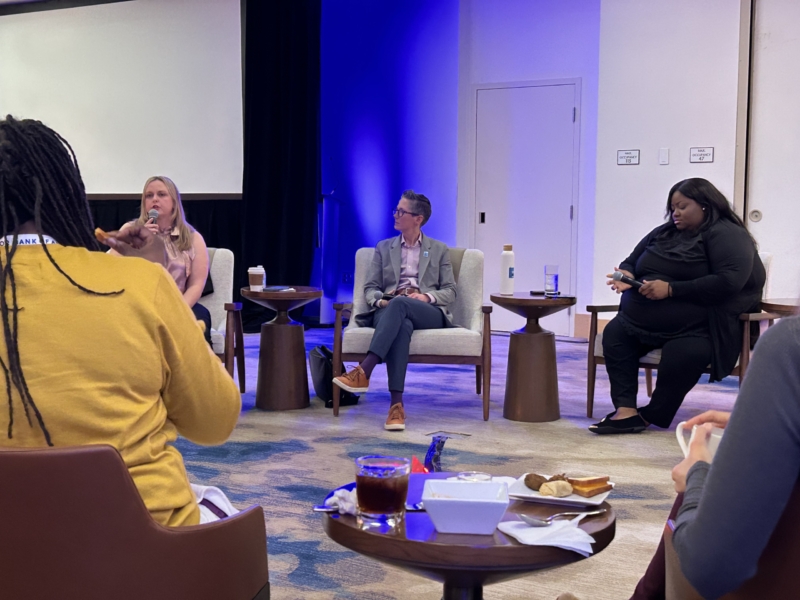
Perhaps the most memorable part of the Summit was the Campfire Conversation on Mentoring Youth in Foster
Care moderated by Rebecca Louve Yao, Executive Director of the National Foster Youth Institute. Joining a panel of leaders in best practices for mentoring youth in foster care, Silver Lining’s CEO Colby Swettberg painted the picture of the critical importance of mentorship for this population. I found myself thinking deeply about our mission and the significance of our work when Colby said “Trauma happens in isolation, but healing happens in community.” The audience received another slice of wisdom when Lived Experience Expert and former foster youth Sabrina Anderson stated “Mentoring shouldn’t just be a privilege for the lucky, but a mandate for the vulnerable.” The takeaway was unanimous that more people in youth-serving organizations across the country need to hear messages like this.
The Summit provided countless takeaways that I believe will strengthen our efforts in the year ahead. With my recent role transition to Assistant Director of Education and Training at Silver Lining, I’ve been thinking more deeply about the importance of specialized mentor training and strategies we can leverage to create better outcomes for youth in care. There’s no doubt that initiatives like the Foster Youth Mentoring Act, collaborations with new and existing partnerships, and sharing best practices on the national scale will help us build stronger programs. The Summit provided the opportune space for a growing sense of mutuality and ownership in working together towards a better future.
Help Us Advance the Mentoring Movement
The Summit energized me now more than ever to invite more people into the Silver Lining community to experience this growing movement. Folks who have an interest and commitment to mentorship can sign up to become a mentor for a young person in foster care. Practitioners can take advantage of the Silver Lining Institute’s no-cost training and consultation services to increase the impact of their mentoring programs through our partnership with the National Mentoring Resource Center (NMRC).
Coming back to the Foster Youth Mentoring Act, anyone interested in topics of advocacy and policy can watch our Fostering Progress webinar on Getting Started with Policy Advocacy & Lived Experience. This resource is full of practical tips to get started in engaging the voices of young people with lived experience in policy advocacy and includes insights from our Lived Experience Fellow, Jarrett Harper. We’re excited to create even more educational offerings this year for mentoring program staff.
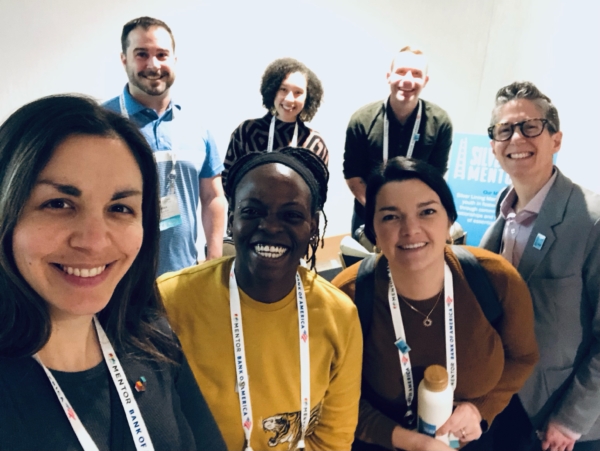
As I reflect on my experience at the National Mentoring Summit and Capitol Hill Day, I’m filled with a renewed sense of purpose and determination in my work. While our efforts to make progress for youth in foster care will surely be challenging, I feel confident that the collaborative efforts of practitioners, mentors, and the voices of young people will continue to make real change for our communities possible.
